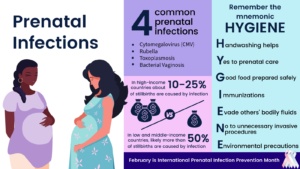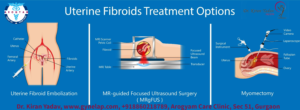International Prenatal Infection Prevention Month
Prenatal infections:
February is International Prenatal Infection Prevention Month. It aims to raise awareness about preventing infections during pregnancy.
Prenatal infections are a significant concern during pregnancy as they can have serious consequences for both the mother and the developing baby. These infections can lead to complications such as miscarriage, preterm birth, birth defects, and even lifelong disabilities in the child. With approximately 60% of pregnant women experiencing at least one infection during their pregnancy, it becomes crucial to understand the risks and take proactive steps to prevent these infections.
Understanding Prenatal Infections
Prenatal infections are caused by various pathogens, including bacteria, viruses, parasites, and fungi, that can be transmitted from the mother to the baby during pregnancy, labor, or delivery. Some of the most common prenatal infections include:
- Cytomegalovirus (CMV): A common viral infection that can cause hearing loss, vision problems, and developmental disabilities in babies.
- Group B Streptococcus (GBS): A bacterial infection that can lead to severe infections in newborns, such as pneumonia, meningitis, and sepsis.
- Toxoplasmosis: Caused by the parasite Toxoplasma gondii, this infection can lead to serious birth defects and developmental issues.
- Rubella (German measles): If contracted during pregnancy, rubella can cause birth defects, including heart defects, deafness, and intellectual disabilities.
- Listeriosis: A bacterial infection caused by Listeria found in contaminated food, which can lead to miscarriage, preterm birth, or severe illness in newborns.
- Zika virus: Transmitted by mosquitoes, Zika can cause microcephaly and other severe brain defects in babies.
- HIV: The virus that causes AIDS can be transmitted from mother to child during pregnancy, delivery, or breastfeeding if not properly managed.
Specific Infections to Be Aware Of during pregnancy
Some infections don’t cause any problem but some infections during pregnancy are particularly dangerous. So it is important to visit gynecologist near you.
- Bacterial vaginosis: Can cause preterm labor.
- Sexually transmitted infections (syphilis, HIV, herpes, chlamydia, gonorrhea, and hepatitis B.) : May cause problems from preterm delivery to infant infections.
- Toxoplasmosis: Can result in disabilities such as blindness and intellectual impairments.
- Cytomegalovirus
- Rubella infection: can result in congenital malformation in fetus
- Malaria
- Hepatitis: Can be transmitted to the infant.
- Asymptomatic bacteriuria- UTI, preterm labour
Prenatal Care to avoid infection during pregnancy:
- Visit doctor before planning pregnancy and get vaccination like Rubella, hepatitis B vaccination.
- Regular visits and checkup during pregnancy with gynecologist near you. Prenatal pregnancy visits can detect infections early and treat any problem like urinary tract infection during pregnancy.
- The recommended schedule for prenatal visits includes:
- Once a month from till 28th week.
- Every two weekly from weeks 28 through 36 weeks
- Weekly after 36 weeks until birth.
- Early diagnosis and treatment reduce the risk of harm to both mother and child.
To Learn More About Pregnancy Care
Prevention of prenatal infections:
 Nutrition: Proper diet and food handling practices are essential.
Nutrition: Proper diet and food handling practices are essential.- Avoid risky behaviors: Limit exposure to potential infections.
- Environmental precautions: Take care with soil, water, and pet hygiene.
- Drink boiled or filtered water.
- Vaccination during pregnancy: protect from some common and dangerous infections, such as flu, Rubella, Hepatitis B and whooping cough. Talk to your doctor about which vaccines you need before and during pregnancy.
- Prevent insect bites. Some insects, such as mosquitoes and ticks, can carry diseases that can harm you and your baby, such as malaria and dengue. Use insect repellent that is safe for pregnant women, wear long-sleeved shirts and long pants when outside, and avoid travel to areas with malaria or other outbreaks.
- Avoid undercooked or raw meats. Meats that are not cooked well can contain harmful bacteria, such as Listeria and Toxoplasma, that can cause infections in you and your baby.
- Avoid unpasteurized milk and cheese. Unpasteurized dairy products can also contain harmful bacteria, such as Listeria, that can cause infections.
- Wash your hands often. Handwashing is one of the best ways to prevent infections and germs from spreading. Wash your hands with soap and water for at least 20 seconds after using the bathroom, touching raw meat, eggs, or vegetables, preparing food and eating, gardening or touching dirt or soil, handling pets, being around people who are sick, getting saliva on your hands, caring for or playing with children, or changing diapers.
- Get tested for sexually transmitted infections (STIs). Some STIs can cause problems for you and your baby, such as syphilis, HIV, herpes, chlamydia, gonorrhea, and hepatitis B. If you have an STI, get treated as soon as possible to prevent complications.





Very interesting details you have observed, appreciate it for posting.<
Pingback: The Importance of Kegel Exercises for Women's Health